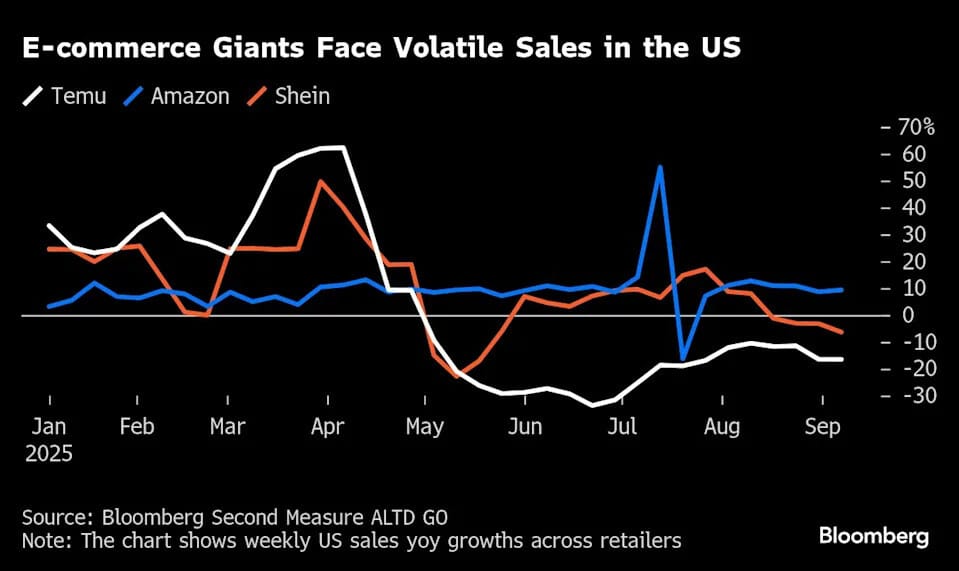- Braun & Brains
- Posts
- How to Manufacture Internet Fandom
How to Manufacture Internet Fandom
Plus: companies cutting jobs in the name of AI, how Julia Fox uses ChatGPT, and Shein opens its Chinese manufacturing network to other brands.
Hi everyone, you might notice the newsletter looks a bit different! I can do things on an Amtrak you can’t even imagine, and one of them is playing creative director of this newsletter. Respond and let me know what you think, whether about the design or any of the content shared.
Today we’re talking about internet fandom in the book publishing world, China’s brain-computer interface industry, and AI agents.
- Rachel
From book clubs to fan clubs, readers have always gathered to chitchat about their recent obsessions. Once popular groups like Tolkien societies have gradually been replaced by BookTok feeds and Reddit threads, with fandom now globally algorithm-amplified. Thanks to the internet, these gatherings are instant, endless, and everywhere. 831 Stories, a venture-backed romance publisher launched in 2024, is trying to capture that energy by engineering fandom into its publishing model from the start.

The company is the second act from Erica Cerulo and Claire Mazur, authors of the longtime newsletter A Thing or Two and founders of the indie retail platform Of a Kind, which paired small-batch goods with storytelling. 831 applies a similar playbook to romance: treat each book as the seed of a broader universe, then scaffold it with events, inside jokes, playlists, merch, and community touchpoints that keep the story alive after the last page.
You can see the model in action with Erika Veurink’s novella Exit Lane, the latest book published by 831. After months of teasers on Substack and TikTok, the book arrived not just with readings but also karaoke nights (an activity her characters also do) and Spotify tracks, right on theme with its publisher’s vision. 831’s approach stretches beyond a single launch. The publisher runs a Discord server where fans in New York and Los Angeles can connect. It’s also rolling out The Ones Membership, a subscription that bundles the next five paperback releases with a welcome box (stickers, bookmarks), member discounts, and access to private events and a gated section of the community for a flat fee. The package feels closer to a Patreon or Substack tier, stories plus perks, not a traditional book club.

Fan fiction sits inside the official ecosystem, not off to the side. Through their Discord, Room 831, and the fanfic platform AO3 (Archive of Our Own), readers are encouraged to post alternate timelines, character backstories, and side plots for titles like Big Fan, Exit Lane, and Comedic Timing. It almost feels like 831 treats each book as the pilot episode of a franchise. The company also experiments with merchandise, including hats that do not look too ‘merchy’ to me. Nothing is worse than wearing merch that looks like merch. Merch is cooler if it is an ‘if you know, you know’ kind of thing.
People often say romance makes up nearly a quarter of all book sales. That’s true if you look at the recent rebound: print sales doubling since 2020 and hitting levels not seen in twenty years. But in historical context, today’s surge is modest compared to the genre’s peak. In the 1980s and 1990s, publishers like Harlequin moved hundreds of millions of copies annually, making romance a much bigger force in the market than it is now. Even with this recent growth, Cerulo and Mazur argue the genre still carries “guilty pleasure” baggage. Their aim is to flip that script by leaning into behaviors that fuel online fandoms: shared language, spin-offs, Easter eggs, and constant participation. They describe it as a hip, horny Hallmark. (Dad… please forget you ever read that).
This is where 831 splits from the Harlequin playbook. Founded in 1949, Harlequin built an empire on serialized titles, strict formulas, and mass distribution through grocery stores and pharmacies. The model was about scale and consistency, delivering dependable tropes on schedule. Both Harlequin and 831 promise familiar romance beats and happy endings, but the operating logic is different. Harlequin industrialized story production for the checkout aisle. 831 is trying to industrialize participation, turning books into internet-native franchises that spill into culture through events, merch, chatrooms, and ongoing community rituals. Harlequin gave readers reliable escape. 831 wants romance in the middle of pop culture, even if plenty of readers would argue it is already there.

2004 vs 2025
Not everyone is convinced. On Reddit, readers questioned whether 831 is really offering anything new. People pointed out that romance already has strong communities through Harlequin, Berkley, Avon, BookTok, Goodreads, and indie spots like The Ripped Bodice. The whole “underserved fandom” pitch rubbed some the wrong way. Others felt the branding came off condescending, like readers still need permission to enjoy the genre. The merch has been especially divisive, with the hats called out for being expensive and just not it. And while 831 positions itself as a gateway for new readers, longtime fans say the recommendations feel narrow and the catalog isn’t distinct enough yet to stand apart.
I like what 831 is trying to build, even with other players already in the space. I’m excited to see where this goes. Right now, I have 20 pages left in Exit Lane, and on Thursday I’m attending an event to see Erika speak. When I get into something, I want to be fully immersed in it, and 831 is giving me the resources to do that—especially as someone who hasn’t read romance before. In an era of chasing virality, tackling fandom is a smart move. Fandom runs deeper; it sticks around and feels personal.
BookTok has already turned series like ACOTAR into viral ecosystems of memes, merch, and bottomless conversation. 831 is not leaving fandom to chance. It is building the system to generate it, essentially creating industry-planted internet fandoms. The Discord, The Ones Membership, the fanfic hub, and the merch are all scaffolding designed to keep the story alive long after the last page. In this model, fandom is not an accident. It is the product.
Tech News
Next-Gen Creation
Meta unveiled $799 Ray-Ban Display AI glasses with an EMG wristband that reads hand muscle signals for touch-free control. Both live demos failed on stage, but Meta left the mishaps in. I still think these are a bit dorky, but one comment that I read mentioned these would be cool for deaf people to have constant subtitles and I think that’s nice. (CNBC)
Related issue: Are your friends recording you?
ElevenLabs launched Studio 3.0, an AI audio editor that now supports video, combining voice, music, and effects into one timeline tool. Let me know if their new voice isolator is better than Descript’s studio sound. (ElevenLabs)
Luma AI partnered with Adobe to bring its Ray3 video model into Firefly. Paid users can now generate realistic 10-second clips without dialogue. Will this be a Google rival? Probably not. (The Hollywood Reporter)
Jobs on the Line
Fiverr laid off 30% of staff (~250 people) as it restructures to become “AI-first.” (Reuters)
How unoriginal. (See: Duolingo with 10% of its contract workers laid off, Salesforce with 4,000 employee layoffs, and SoftBank Vision Fund with 20% layoffs.)

Seattle’s tech economy is slowing after repeated layoffs at Amazon and Microsoft, cutting into the wider city economy. (The Wall Street Journal)
President Trump signed a proclamation requiring companies to pay $100,000 per H-1B visa annually, a move that could hit tech hiring hard. (Reuters)
Elliott Investment Management, the activist hedge fund run by Paul Singer, took a $2B stake in Workday, saying its multiyear plan will create “substantial long-term value.” I smell layoffs. (CNBC)
Made in China
Shein introduced Xcelerator, opening its Chinese manufacturing network to other brands as a way to generate new revenue while tariffs weigh on its low-cost retail model. The company is doing better than Temu but has seen pretty uneven US sales since the end of tariff exemptions. Its IPO plans in the US collapsed and a Hong Kong listing is now facing challenges. (Bloomberg)

Neuralink plans a U.S. clinical trial in October to test its brain-to-text implant, aiming for healthy patient use by 2030. Meanwhile, China’s state-backed BCI industry is worth ~$450M and growing 20% Y/Y. (Bloomberg)
Agents and Assistance
ChatGPT in the Wild
Share Braun & Brains, a newsletter about tech & adjacent topics.



Reply